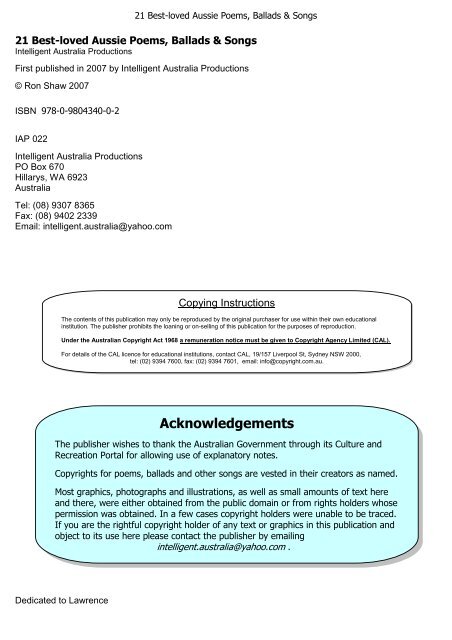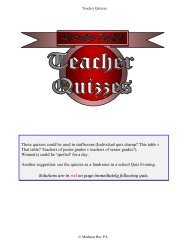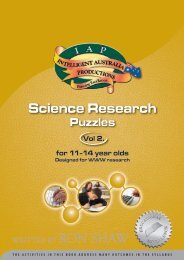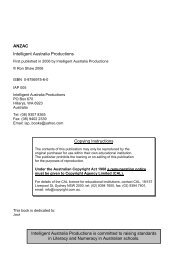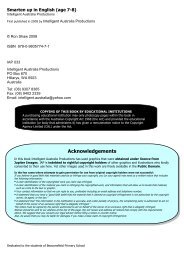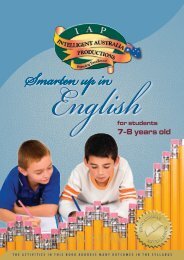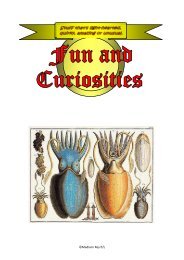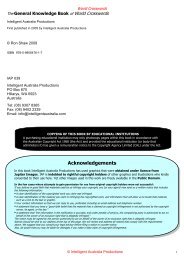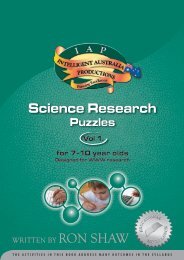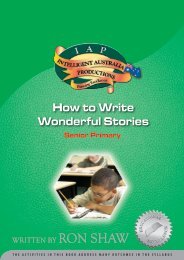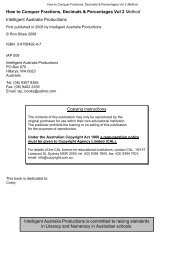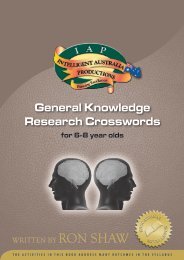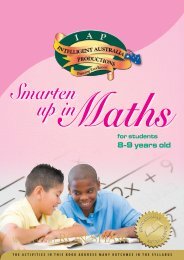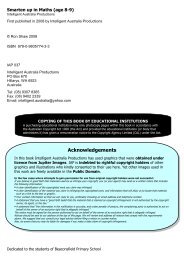Questions - Australian Teacher
Questions - Australian Teacher
Questions - Australian Teacher
You also want an ePaper? Increase the reach of your titles
YUMPU automatically turns print PDFs into web optimized ePapers that Google loves.
21 Best-loved Aussie Poems, Ballads & Songs<br />
21 Best-loved Aussie Poems, Ballads & Songs<br />
Intelligent Australia Productions<br />
First published in 2007 by Intelligent Australia Productions<br />
© Ron Shaw 2007<br />
ISBN 978-0-9804340-0-2<br />
IAP 022<br />
Intelligent Australia Productions<br />
PO Box 670<br />
Hillarys, WA 6923<br />
Australia<br />
Tel: (08) 9307 8365<br />
Fax: (08) 9402 2339<br />
Email: intelligent.australia@yahoo.com<br />
Copying Instructions<br />
The contents of this publication may only be reproduced by the original purchaser for use within their own educational<br />
institution. The publisher prohibits the loaning or on-selling of this publication for the purposes of reproduction.<br />
Under the <strong>Australian</strong> Copyright Act 1968 a remuneration notice must be given to Copyright Agency Limited (CAL).<br />
For details of the CAL licence for educational institutions, contact CAL, 19/157 Liverpool St, Sydney NSW 2000,<br />
tel: (02) 9394 7600, fax: (02) 9394 7601, email: info@copyright.com.au.<br />
Acknowledgements<br />
The publisher wishes to thank the <strong>Australian</strong> Government through its Culture and<br />
Recreation Portal for allowing use of explanatory notes.<br />
Copyrights for poems, ballads and other songs are vested in their creators as named.<br />
Most graphics, photographs and illustrations, as well as small amounts of text here<br />
and there, were either obtained from the public domain or from rights holders whose<br />
permission was obtained. In a few cases copyright holders were unable to be traced.<br />
If you are the rightful copyright holder of any text or graphics in this publication and<br />
object to its use here please contact the publisher by emailing<br />
intelligent.australia@yahoo.com .<br />
Dedicated to Lawrence
21 Best-loved Aussie Poems, Ballads & Songs<br />
<br />
Postal Address<br />
IAP<br />
PO Box 670<br />
Hillarys, WA<br />
Australia 6923<br />
<br />
Email<br />
iap_books@yahoo.com<br />
Telephone<br />
<br />
(08) 9307 8365 Int’l (618) 9307 8365<br />
Fax<br />
<br />
(08) 9402 2339 Int’l (618) 9402 2339<br />
Intelligent Australia Productions is committed to raising standards<br />
in Literacy and Numeracy in <strong>Australian</strong> schools.<br />
www.intelligentaustralia.com<br />
© Intelligent Australia Productions 1
21 Best-loved Aussie Poems, Ballads & Songs<br />
Contents<br />
Title<br />
Focus Element<br />
Revision<br />
Creator<br />
<strong>Teacher</strong>s Notes<br />
3<br />
Waltzing Matilda A.B (Banjo) Paterson<br />
14<br />
My Country Dorothea Mackellar 15<br />
Along the Road to Gundagai<br />
Jack O'Hagan<br />
The Drover’s Wife<br />
Henry Lawson<br />
Kitty’s Broom<br />
Breaker Morant<br />
Sun Arise Rolf Harris/ Harry Butler 19<br />
True Blue<br />
John Williamson<br />
I Still Call Australia Home<br />
Peter Allen<br />
Home Among the Gum Trees B. Brown/ W. Johnson 22<br />
The Man from Ironbark A.B (Banjo) Paterson<br />
23<br />
Andy’s Gone with Cattle<br />
Henry Lawson<br />
Moreton Bay Francis MacNamara 25<br />
The Melbourne Cup<br />
Slim Dusty<br />
Click Go the Shears<br />
Percy Jones<br />
Our Don Bradman<br />
Jack O'Hagan<br />
Botany Bay<br />
unknown<br />
Tie Me Kangaroo Down Sport<br />
Rolf Harris<br />
Queensland Drover<br />
unknown<br />
Where the Pelican Builds Her Nest Mary Hannay-Foott 32<br />
The Man from Snowy River A.B (Banjo) Paterson<br />
33<br />
The Wild Colonial Boy<br />
unknown<br />
© Intelligent Australia Productions 2<br />
Page<br />
16<br />
17<br />
18<br />
20<br />
21<br />
24<br />
26<br />
27<br />
28<br />
29<br />
30<br />
31<br />
34
21 Best-loved Aussie Poems, Ballads & Songs<br />
<strong>Teacher</strong>s Notes<br />
This book was created to familiarize <strong>Australian</strong> students with our best-known<br />
works of literature and song lyrics.<br />
Having children study these works will help our unique culture and history to<br />
live on into future generations.<br />
Some works are not presented here in their entirety.<br />
This is for two reasons: (1) the full piece may be very long (2) one or more<br />
verses may not be easily comprehended by children.<br />
Offering excerpts or selected verses only, ensures greater degrees of<br />
familiarity and understanding.<br />
The poems and songs that have come from people's experiences of living and<br />
surviving in the <strong>Australian</strong> bush were often written by ordinary, everyday<br />
people and are a record of the colourful language of bush life.<br />
The convict songs of the early days of the <strong>Australian</strong> colonies became the<br />
foundation of Australia's bush music. Bush ballads recorded the harsh way of<br />
life and descriptions of contemporary events. They provide an accurate record<br />
of the lives and loves of bushrangers, swagmen, drovers, and shearers.<br />
How to Treat the Selected Works<br />
Photocopy the poem/song and distribute copies to students.<br />
Present some background information about the work and/or the author (see notes that follow).<br />
Students read through the piece by themselves. This to be followed by a teacher-class discussion,<br />
verse by verse, wherein the meanings of key words or phrases are explained. The requirements of<br />
some questions may also need to be clarified.<br />
In answering the questions students should be encouraged to use their own words (unless asked<br />
otherwise).<br />
The notes that follow will provide teachers and their<br />
students with some background to each of the<br />
twenty-one works and their creators.<br />
<br />
see over<br />
© Intelligent Australia Productions 3
21 Best-loved Aussie Poems, Ballads & Songs<br />
Waltzing Matilda p14<br />
A.B (Banjo) Paterson<br />
Waltzing Matilda was inspired by the death of a swagman-shearer during the shearers' strikes of the 1890s.<br />
The song is supposed to have been based on an actual incident which happened during a depression during 1895 when<br />
work was scarce, and revolves around a swagman who is looking for work. The swagman is so-called because he carries<br />
his swag on his back.<br />
A swagman sets up camp for the night near a billabong, under the shade of a coolibah tree and puts his billy on to boil<br />
water over a camp fire to make tea to drink. A jumbuck comes down to drink from the billabong, and the hungry<br />
swagman catches the sheep, intending to eat it for dinner. The swagman shoves the sheep into his tucker-bag to restrain<br />
it and stop it from running away. However the squatter has witnessed what has happened and brings three troopers with<br />
him to arrest the swagman. The troopers tell the swagman that they are there to arrest him for stealing the sheep, and<br />
that he has to 'come with them to the jail'. The swagman, who is well aware that the penalty for sheep stealing is<br />
execution by hanging, then dives into the billabong to swim away and escape arrest.<br />
However the swagman is not a strong swimmer and he drowns.<br />
Glossary<br />
* Waltzing Matilda: to carry one's swag from camp to camp<br />
* swagman: an itinerant farmhand, carrying his "swag" (his blankets) rolled into a cylinder<br />
* billabong: a creek (normally with a pronounced "oxbow" bend)<br />
* coolibah tree: a eucalypt (gum) tree<br />
* billy: a tin can used to heat water over a campfire to make tea<br />
* jumbuck: sheep<br />
* tucker-bag: bag or box used to store food<br />
* squatter: farmer/grazier who found good land and took possession; some became extremely rich<br />
* trooper: policeman or soldier on horseback<br />
My Country p15<br />
Dorothea Mackellar<br />
Isobel Marion Dorothea Mackellar (1885-1968) was a poet and fiction writer. Her poetry is usually regarded as bush<br />
poetry, inspired as it is by her experience on her brothers' farms near Gunnedah, New South Wales. Her best-known<br />
poem is My Country written at age 19 while homesick in England, and first published in the London Spectator in 1908<br />
under the title Core of My Heart.<br />
Four volumes of her collected verse were published: The Closed Door, published in 1911, and containing the first<br />
appearance of My Country under its present name; The Witchmaid (1914); Dreamharbour (1923); and Fancy Dress<br />
(1926).<br />
In 1984 Gunnedah resident Mikie Maas created the "Dorothea Mackellar Poetry Awards", which has grown into a<br />
nationwide poetry competition for <strong>Australian</strong> school students.<br />
Dorothea Mackellar was made an Officer of the Order of the British Empire for her contribution to <strong>Australian</strong> literature in<br />
1968, two weeks before her death. A memorial to Mackellar stands in ANZAC Park in Gunnedah. A federal electorate<br />
covering half of Sydney's Northern Beaches and a Canberra suburb are named in her honour.<br />
© Intelligent Australia Productions 4
21 Best-loved Aussie Poems, Ballads & Songs<br />
Along the Road to Gundagai p16<br />
Jack O'Hagan<br />
―Along the Road to Gundagai‖ is considered an <strong>Australian</strong> folk tune.<br />
The first line of the chorus is instantly recognisable, due to its use of rhyme and repetition.<br />
Gundagai is a charming historic township on the banks of the Murrumbidgee River in New South Wales.<br />
The town is forever associated with the dog on the tuckerbox in <strong>Australian</strong> folklore.<br />
Perhaps more than any other <strong>Australian</strong> town Gundagai has proved an irresistible subject with writers of popular verse.<br />
This probably relates to the fact that Five Mile Creek, to the north of town, was a popular meeting place with teamsters,<br />
drovers, shearers and bush travellers.<br />
'Lazy Harry' and 'Flash Jack from Gundagai' are anonymous poems relating to the town.<br />
Jack O'Hagan, who had never been to Gundagai, wrote ―Along the Road to Gundagai‖, a nostalgic and highly sentimental<br />
song, in 1922. It became an international success and the signature tune for the popular radio show 'Dad and Dave'.<br />
O'Hagan later wrote ―Where the Dog Sits on the Tucker-box‖ and ―When a Boy from Alabama Meets a Girl from<br />
Gundagai‖. The hero of Henry Lawson's ―Scots of the Riverina‖ has a farm 'by Gundagai' while C.J. Dennis mentions the<br />
town in ―The Traveller‖.<br />
The bush was a favourite subject of <strong>Australian</strong> songs, although it was often portrayed as a place people had left and<br />
longed to return to.<br />
The Drover’s Wife p17<br />
Henry Lawson<br />
Henry Lawson is among the best-known <strong>Australian</strong> poets and fiction writers of the colonial period.<br />
Many believe he was the first poet to capture the <strong>Australian</strong> way of life and today Henry Lawson's work is an inspiration<br />
to many <strong>Australian</strong>s.<br />
Henry Lawson was born in 1867, on a goldfield in rural New South Wales.<br />
His father was mining there, and times were tough. The Lawsons were very poor.<br />
Henry didn't get a good education but his mother gave him lots of books.<br />
Henry was a shy, sensitive child. He wasn't like most bush boys. Even his mother thought he was a bit strange.<br />
When he was nine years of age, Henry got an ear infection and went partly deaf. By the time he was fourteen years old<br />
he was totally deaf.<br />
The kids at school tormented Henry and he became more of a loner.<br />
Writing was a way for Henry to express his feelings.<br />
Much of his inspiration came from the <strong>Australian</strong> bush and its people. Because he'd known the hardships of bush life<br />
Henry could understand its ways.<br />
In those days reading poetry was a popular pastime. People looked up to writers...everyone had a favourite poet.<br />
In 1888 the Sydney Bulletin started to publish Henry's stories and poems. People could see he understood life in<br />
Australia, and he soon had loyal readers.<br />
Although his own life was often unhappy, Henry Lawson was kind to others. He found time for those less fortunate than<br />
himself. He felt he had something in common with homeless people.<br />
Henry Lawson may not have led the life he hoped for but he's now widely recognised as Australia's poet of the people.<br />
© Intelligent Australia Productions 5
21 Best-loved Aussie Poems, Ballads & Songs<br />
Kitty’s Broom p18<br />
Breaker Morant<br />
Harry 'Breaker' Morant (1864– 1902) was a drover, horseman, poet, and soldier whose renowned skill with horses earned<br />
him the nickname ‗The Breaker‘. Articulate, intelligent, and well educated, he was also a published poet, with the bulk of<br />
his work appearing in The Bulletin magazine.<br />
In the century-plus years since his death, Morant has become a folk hero in Australia. His story has been the subject of<br />
several books and a major <strong>Australian</strong> feature film.<br />
Morant emmigrated to Australia from England as a 19 year old and settled in outback Queensland. Over the next fifteen<br />
years, working in Queensland, New South Wales and South Australia, this charismatic roustabout made a name for<br />
himself as a bush poet and gained renown as a fearless and expert horseman.<br />
He worked for several years as an itinerant drover and horse-breaker, as well as writing his popular bush ballads,<br />
becoming known to and friendly with famed <strong>Australian</strong> poets Henry Lawson and Banjo Patterson.<br />
Sun Arise p19<br />
Rolf Harris/ Harry Butler<br />
Rolf Harris (born in 1930) is an <strong>Australian</strong> musician, composer, painter, and television host.<br />
He was born in Perth, Western Australia and was named after Rolf Boldrewood, an <strong>Australian</strong> writer whom his mother<br />
admired.<br />
Rolf has spoken of his "great respect and love'' for Aborigines.<br />
‗Sun Arise‘ echoes the sound of the didgeridoo (using four double basses) and also imitates the sounds associated with an<br />
aboriginal corroboree. The song was a big hit.<br />
True Blue p20<br />
John Williamson<br />
True Blue is an <strong>Australian</strong> folk song written in 1981 by singer-songwriter John Williamson.<br />
The song uses <strong>Australian</strong> slang, with the title being an example of this, meaning totally <strong>Australian</strong>.<br />
True Blue is often performed at sporting events and was performed by Williamson twice on acoustic guitar at Australia<br />
Zoo during Steve Irwin's public memorial service (it was Steve's favourite song); once shortly after the beginning<br />
ceremony, and again at the end as Irwin's truck was driven out of the Crocoseum for the final time.<br />
The song had notable success, in particular in more rural areas of Australia. At the country music awards in 1982, True<br />
Blue took out Tamworth Music Festival‘s ‗Golden Fiddle‘ for best song writer and composer.<br />
The song has become the anthem for the <strong>Australian</strong> national cricket team.<br />
Glossary<br />
* smoko: to 'knock off for a smoko' is to have a break for a coffee, tea or cigarette<br />
* true blue: steadfast loyal <strong>Australian</strong> who displays the Aussie ideals of a fair go for all, mateship, having a go, and<br />
solving problems<br />
* fair dinkum: virtually the same as True Blue - honest, reliable, trustworthy, dinki-di; someone who has embraced the<br />
Aussie attitudes to everything, especially mateship. 'Are you fair dinkum' means 'are you telling the truth'<br />
© Intelligent Australia Productions 6
21 Best-loved Aussie Poems, Ballads & Songs<br />
I Still Call Australia Home p21<br />
Peter Allen<br />
Peter Allen (1944 – 1992) was an <strong>Australian</strong> songwriter and singer.<br />
Born Peter Allen Woolnough in Tenterfield, New South Wales, Allen began his performing career as one of the Allen<br />
Brothers who were a popular cabaret and television act in the early 1960s.<br />
Peter performed on <strong>Australian</strong> Television at many important occasions: in front of Queen Elizabeth II in 1980 at the<br />
Sydney Opera House, Prince Charles and Princess Diana (in Melbourne and Sydney) and at the 1980 <strong>Australian</strong> Football<br />
Grand Final in Melbourne.<br />
A musical based on his life, titled The Boy from Oz, featuring Todd McKenney, and, later, Hugh Jackman, used his largely<br />
autobiographical songs to form the soundtrack.<br />
After his death, I Still Call Australia Home, one of his older songs, came to be regarded as an unofficial <strong>Australian</strong> national<br />
anthem.<br />
Home Among the Gum Trees p22<br />
B. Brown and W. Johnson<br />
This was the theme song to the popular <strong>Australian</strong> television show Burke‘s Backyard.<br />
It contains much ‗<strong>Australian</strong>a‘.<br />
The home described, with its clothesline out the back, verandah out the front, a sheep and a kangaroo, is a much-loved<br />
typical <strong>Australian</strong> rural home.<br />
© Intelligent Australia Productions 7
21 Best-loved Aussie Poems, Ballads & Songs<br />
The Man from Ironbark p23<br />
A.B (Banjo) Paterson<br />
Andrew Barton ‗Banjo' Paterson (1864-1941) was a poet, ballad writer, journalist and horseman.<br />
His parents, Andrew Bogle and Rose Isabella Paterson were graziers on Illalong station in the Yass district of New South<br />
Wales.<br />
Paterson's early education took place at home under a governess and then at a bush school in Binalong, the nearest<br />
township. From about the age of ten years he attended the Sydney Grammar School. He lived with his grandmother and<br />
spent the school holidays at Illalong station with his family.<br />
After completing school the 16-year-old Paterson worked for a Sydney firm of solicitors and was admitted as a solicitor in<br />
1886. In the ensuing years Paterson began publishing verse in the Bulletin and Sydney Mail under the pseudonyms 'B'<br />
and 'The Banjo'.<br />
In 1890, Banjo wrote "The Man from Snowy River‖, a poem which caught the heart of the nation, and in 1895 he had a<br />
collection of his works published under that name. This book is the most sold collection of <strong>Australian</strong> Bush poetry and is<br />
still being reprinted today.<br />
Paterson's poems mostly presented a highly romantic view of rural Australia.<br />
His famous poem "Waltzing Matilda‖ was set to music and became one of Australia's most famous songs. Another of his<br />
poems, "Clancy of the Overflow‖, is the tale of a Queensland drover…a drover is a cattle handler responsible for herding<br />
large mobs of cattle long distances to market.<br />
Paterson authored two novels; ―An Outback Marriage‖ (1906) and ―The Shearer's Colt‖ (1936), as well as writing many<br />
short stories. He also wrote a book for children, ―The Animals Noah Forgot‖ (1933).<br />
Banjo Paterson's image appears on the <strong>Australian</strong> $10 note, along with an illustration inspired by "The Man From Snowy<br />
River".<br />
Andy’s Gone with Cattle p24<br />
Henry Lawson<br />
Andy's Gone with Cattle, Henry Lawson‘s famous song about droving, was first published in October 1888 in the Town<br />
and Country journal.<br />
Droving is the <strong>Australian</strong> outback‘s term for the movement of stock to market, pasture or water.<br />
And men like Andy - horseback drovers - have been driving the cattle or sheep through Australia‘s interior since the<br />
country‘s livestock industry got off the ground in the early 19th century.<br />
Drover‘s endured remote, diverse locations. They began to make stock routes that crisscrossed the country (many are still<br />
in use and open today).<br />
Henry Lawson had walked from Bourke to Hungerford and back, and it was during this time that he came to be very<br />
conscious of the hardships of bush life.<br />
After the gold rush of the mid-to-late 19th century, drovers forged a unique frontier culture that bush poets, authors and<br />
songwriters have since immortalized. The outback was being settled and droving was the reason why.<br />
In the pioneering days, ―The length of a drive here was further than anywhere else in the world,‖ says former drover<br />
Bruce Simpson. The survival of these epic expeditions depended upon planning, strong men and obedient horses - but<br />
above all upon the cook‘s competency. Drovers relished their campfire dinner of thick beef stew, unleavened damper<br />
bread and a strong cup of black billy tea.<br />
© Intelligent Australia Productions 8
21 Best-loved Aussie Poems, Ballads & Songs<br />
Moreton Bay p25<br />
Francis MacNamara<br />
Many convicts were unable to read or write very well (like a large percentage of the British population at the time). The<br />
use of songs was particularly important as it provided a means to record popular feelings as well as events and<br />
individuals‘ stories.<br />
Convict songs like Jim Jones, Van Diemen's Land and Moreton Bay were often sad or critical. Convicts such as Francis<br />
MacNamara, known as 'Frankie the Poet', were flogged for composing original ballads with lines critical of their captors.<br />
Despite this, 'the convicts could not be stopped from singing' (Edgar Waters).<br />
The lines from the song Moreton Bay (c. 1920s), attributed to Francis MacNamara, tell of the hardship a convict has<br />
experienced at different penal settlements around Australia.<br />
The Melbourne Cup p26<br />
Slim Dusty<br />
David Gordon "Slim Dusty" Kirkpatrick, AO, OBE (1927—2003) was an iconic <strong>Australian</strong> country music singer-songwriter.<br />
Slim was born in Kempsey, New South Wales, the son of a cattle farmer. He adopted the stage name "Slim Dusty" in<br />
1938 at eleven years of age. Slim released his first record in 1945 at the age of nineteen.<br />
His 1957 hit "A Pub With No Beer" was the biggest-selling record by an <strong>Australian</strong> to that time, and the first <strong>Australian</strong><br />
single to go gold. Over the course of his career he collected more gold and platinum albums than any other <strong>Australian</strong><br />
artist. Slim not only recorded songs written by himself and other fellow <strong>Australian</strong> performers, but also recorded classic<br />
<strong>Australian</strong> poems by Henry Lawson and Banjo Paterson with new tunes, to call attention to the old 'Bush Ballads.' In all,<br />
he won a record 35 "Golden Guitars" over the years. Slim Dusty, with wife Joy McKean, were patrons of the National<br />
Truck Drivers' Memorial located at Tarcutta, New South Wales.<br />
© Intelligent Australia Productions 9
21 Best-loved Aussie Poems, Ballads & Songs<br />
Click go the Shears p27<br />
Percy Jones<br />
After the gold rushes, shearers and drovers composed ballads and songs which became part of the oral tradition of<br />
<strong>Australian</strong> bush music. Click go the Shears is perhaps the most widely sung shearers‘ song.<br />
Blade shears were used in woolsheds everywhere until the 1880s, when they began to be replaced by machine shears.<br />
Blade shearing, or hand shearing as it was also called, did survive for awhile in Australia.<br />
In 1892, the legendary shearer Jackie Howe (1861-1920) used blades to shear 321 sheep in seven hours and forty<br />
minutes at Alice Downs Station in Queensland, a feat which at the time seemed almost superhuman.<br />
In fact, Howe‘s record of 321 sheep in a day was not broken even with machine shears until 1950.<br />
By the early 1900s, however, blade shearing had all but died out in Australia. It did (and does) survive in New Zealand,<br />
mainly because in cold climates shearers like to leave some wool on the sheep, and it is easier to do this with blades than<br />
with machine shears.<br />
Shearing blades were roughly like scissors, the main difference being that they were hinged at the gripping end, not in<br />
the middle, and there was a spring to force the blades apart each time they were pulled together.<br />
The blades themselves, as used in 1861, were about eighteen centimeters long (actually seven inches) and had one long<br />
spring.<br />
In the 1880s, blades became double-sprung. Blade shears were usually imported from Sheffield in England.<br />
Apart from improvements in shears, wool presses and other equipment, the operation of a shearing shed has not<br />
changed a lot since 1861.<br />
In the mid-1800s shearing was still often done by workers at the sheep station: shepherds, stationhands, and even the<br />
squatter himself.<br />
Over the years it became more and more a specialist‘s job until by the 1880s it was largely done by professional shearers:<br />
skilled men who moved from station to station.<br />
Shearing was a tough job. Shearers sometimes travelled between stations on horseback but usually they did it on foot,<br />
which meant they had to tramp huge distances carrying their swag. (By the early 1900s, many shearers were getting<br />
about on bikes.)<br />
Their living conditions were primitive and the job was physically exhausting, but they did get paid relatively well: enough<br />
to be the envy of other station workers.<br />
What hours did a shearer work in 1861<br />
Normally, he would have started shearing at 7am. There would have been a 15-minute smoko in the morning, probably<br />
at 9am, a half-hour break for lunch at midday, a second 15-minute smoko around at 2.30pm and a fourth and last one at<br />
4.30pm. Shearing would go on until 6.30pm.<br />
Shearers worked six full days a week, from Monday to Saturday, and had Sunday off.<br />
The work schedule could be varied, of course. At a smaller, family-run property like Oxley Downs, the shearers might<br />
start hours earlier, at first light, but then have a three-hour break during the hottest part of the day.<br />
In big sheds, the start and end of each working session were signalled by the ring of a bell. This would not have been<br />
necessary in smaller sheds, though. There, everyone could hear the boss of the boards when he called, 'Smoko!' or 'Back<br />
to work!'<br />
Our Don Bradman p28<br />
Jack O'Hagan<br />
This jaunty ditty was first performed in 1930 by Art Leonard (with novelty accompaniment).<br />
Our Don Bradman got the patriotic juices flowing with the line: ―Now I ask you is he any good‘‘ to which one of the<br />
answers was the unforgettable lyric: ―As a batsman he is certainly plum pud.‘‘<br />
Many cricket lovers, the world over, are aware of Don Bradman‘s remarkable batting average of 99.94 runs in test cricket.<br />
This is almost double the average of other great players.<br />
Donald George Bradman was born at Cootamundra in New South Wales on the 27th August 1908. He spent his childhood<br />
years growing up in Bowral, where as a young school boy he tirelessly hit a golf ball with a cricket stump against a<br />
rainwater tank at the Bradman family home. By doing so he taught himself hand-eye co-ordination that he later<br />
demonstrated whilst becoming the greatest batter of all time.<br />
© Intelligent Australia Productions 10
21 Best-loved Aussie Poems, Ballads & Songs<br />
Botany Bay p29<br />
unknown<br />
On the 29th April 1770 a British ship named the Endeavour, under the command of Captain James Cook, anchored in<br />
what was later named Botany Bay. The first fleet, consisting of eleven vessels, entered Botany Bay on January 19, 1788.<br />
They carried about 730 convicts and 250 free settlers. Today Botany Bay is surrounded by the suburbs of Sydney.<br />
This poem was written about a time when even a small crime could get you shipped off to Australia for 7 years as a<br />
convict. The poem talks about this in the first verse and finishes in the last verse with a warning to boys and girls<br />
(Dookies and Duchesses) not to steal or they'll wind up in Botany Bay.<br />
Glossary:<br />
swell a person who is well dressed.<br />
to cut a swell to make a good impression.<br />
Tie Me Kangaroo Down Sport p30<br />
Rolf Harris<br />
"Tie Me Kangaroo Down, Sport", a song written by Rolf Harris in 1957, became a hit across the world in the 1960s.<br />
Inspired by Harry Belafonte's calypsos, and about an <strong>Australian</strong> stockman on his deathbed, the song is one of the best<br />
known and most successful <strong>Australian</strong> songs after Waltzing Matilda.<br />
The recording of the song, with Rolf Harris, reached #3 on the US charts in 1963. Harris re-recorded it along with The<br />
Wiggles in 2005. It is still popular today as a children's song.<br />
The stockman instructs his friend to take care of his affairs. The first of these is to watch his wallabies feed, then to tie<br />
his kangaroo down, since they jump around. "Sport" is a term of address, alluding to "good sport", which often, as in this<br />
case, praises someone for carrying out a small favour you are asking of them.<br />
© Intelligent Australia Productions 11
21 Best-loved Aussie Poems, Ballads & Songs<br />
Queensland Drover p31<br />
unknown<br />
Stockmen and drovers, known as ‗overlanders', developed pride in the skills which required them to drive sheep and<br />
cattle over long distances. This is expressed in many of their ballads and songs such as The Queensland Drover, with its<br />
stirring chorus<br />
Pass the billy round boys!<br />
Don't let the pint-pot stand there!<br />
For tonight we'll drink to the health<br />
Of every overlander.<br />
The Queensland drover lived a life of loneliness, isolation and hardship. The resilience shown by the drover when faced<br />
with these hurdles is typical of our pioneer forebears and this pioneer resilience helped fuel the rapid development of<br />
Queensland as well as shape our national identity.<br />
Amongst the drover‘s many worries was flood. Many cattle drovers found themselves trapped on some high ground for<br />
weeks on end, as the swirling waters flowed passed. Every log and branch that washed up on their island caused<br />
consternation for both man and beast. For each log or branch would be crawling with bull-dog ants, scorpions, centipedes<br />
or snakes, which had to be killed before they sent the cattle mad.<br />
Sudden dry spells were just as common as flood, particularly when droving around the Gulf country. Finding food for the<br />
cattle was the greatest problem faced during these dry spells. When food was short the drovers would have to cut and<br />
crush short rushes from creek and river beds, enough to feed the whole mob.<br />
The rivers of southern Queensland were notorious for sandflies, which drove the cattle, horses and humans mad with<br />
scratching, and when droving in the north a mosquito net was a necessity. In the north, every drover was on the lookout<br />
for crocodiles. Many slept in trees rather than risk a night on the ground. Wild animals could cause stampedes. When wild<br />
horses appeared the stallions would cause havoc among the droving horses, and dingoes would send the herds crazy<br />
with fear.<br />
But it wasn‘t wild horses or dingoes that the drover feared the most. It was the camel. Because of the soft pads on their<br />
feet camels were as quiet as ghosts and were on top of the mob before the drover knew it. Not only did they send cattle<br />
wild but the horses were scared stiff of them and after a visit from camels the drovers would be forced to round up the<br />
scattered herd.<br />
The drover‘s life was not an easy one.<br />
Where the Pelican Builds Her Nest p32<br />
Mary Hannay-Foott<br />
Mary Hannay Foott (1846 –1918) was an <strong>Australian</strong> poet.<br />
Her husband died in 1884 from over-work and exposure during the drought of that year, and the losses of stock were so<br />
great that Mrs Foott was obliged to sell her interest in the property and move to Toowoomba, Queensland.<br />
In July 1885 she went to Rocklea, near Brisbane, and opened a private school which supported her family. In the same<br />
year she published her first volume of poetry,Where the Pelican Builds and Other Poems.<br />
Mrs Foott's published verse was small in quantity but of good quality. "Where the Pelican Builds Her Nest", written in<br />
1881, is included in most <strong>Australian</strong> anthologies.<br />
Mary Hannay-Foott said that according to the bushmen of Western Queensland the pelican‘s nest is seldom, if ever,<br />
found.<br />
© Intelligent Australia Productions 12
21 Best-loved Aussie Poems, Ballads & Songs<br />
The Man from Snowy River p33<br />
A.B (Banjo) Paterson<br />
The spirit of the <strong>Australian</strong> Outback, and the essences of the bushmen and women who pioneered it, is captured in the<br />
ballads and poetry of Banjo Paterson. The vast distances, the droughts, the floods, the flies, the heat, and the harsh and<br />
beautiful places of Outback Australia were brought to the city people of the late 1880's through Paterson‘s writings.<br />
A true folk poet, a recorder and publisher of <strong>Australian</strong> bush songs, Banjo brought the legendary magic of the <strong>Australian</strong><br />
bush into the household, the schools and the government.<br />
The Man from Snowy River, tells the story of a young mountain lad, mounted on a small mountain pony, who rides out<br />
with the experienced stockmen in pursuit of a runaway horse. Because of his size, and the size of his pony he is at first<br />
ridiculed but when the untamed bush horses take to the wild and rugged mountain tracts, he and his pony grow in<br />
stature.<br />
The Wild Colonial Boy p34<br />
unknown<br />
This classic bush ballad was first published in 1881. Historians, folklorists and others have wondered about this<br />
mysterious character ever since. The Wild Colonial Boy is generally believed to be either a wholly fictional character or<br />
very loosely based on Bold Jack Donohoe, a convict bushranger of the 1820s.<br />
Jack Donahoe was born in Ireland. At the age of 18, in 1824, he was transported to Australia. By 1827 he was caught<br />
stealing with two others. Donahoe escaped, but the two others were hanged.<br />
Donahoe teamed up with another gang which became so notorious that a special patrol was formed to hunt them. Again,<br />
though others were captured or killed, Donahoe escaped. He took up with yet another gang. They became known for<br />
their stylish dress, as they exchanged clothes with people in the coaches they held up. In 1830 Donahoe was finally<br />
ambushed by police near Sydney. He was killed in the ensuing battle. The ballad Bold Jack Donahoe appeared soon after<br />
his death. Authorities banned its singing in beer shops and taverns.<br />
© Intelligent Australia Productions 13
21 Best-loved Aussie Poems, Ballads & Songs<br />
Waltzing Matilda<br />
A.B (Banjo) Paterson<br />
Once a jolly swagman camped by a billabong,<br />
Under the shade of a coolibah tree,<br />
And he sang as he watched and waited till his billy<br />
boiled,<br />
"Who'll come a-waltzing Matilda with me<br />
Chorus Waltzing Matilda, Waltzing Matilda,<br />
Who'll come a-waltzing Matilda with me"<br />
And he sang as he watched and waited till his billy<br />
boiled,<br />
"Who'll come a-waltzing Matilda with me"<br />
Down came a jumbuck to drink at the billabong:<br />
Up jumped the swagman and grabbed him with glee.<br />
And he sang as he shoved that jumbuck in his tuckerbag,<br />
"You'll come a-waltzing Matilda with me.<br />
Chorus (3 rd line is now…. And he sang as he shoved<br />
that jumbuck in his tucker-bag)<br />
Up rode a squatter, mounted on his thoroughbred;<br />
Down came the troopers, one, two, three:<br />
"Who's that jolly jumbuck you've got in your tucker-bag<br />
You'll come a-waltzing Matilda with me!<br />
Chorus (3 rd line is now…."Who's that jolly jumbuck<br />
you've got in your tucker-bag)<br />
Up jumped the swagman and sprang into the billabong;<br />
"You'll never catch me alive!" said he;<br />
And his ghost may be heard as you pass by that<br />
billabong,<br />
"You'll come a-waltzing Matilda with me!<br />
Chorus (3 rd line is now….And his ghost may be heard as<br />
you pass by that billabong)<br />
<strong>Questions</strong><br />
1. What is a swagman<br />
2. Why is a billabong a good place to<br />
camp at<br />
3. How did swagmen boil their billy<br />
4. What does „grabbed him with<br />
glee‟ mean<br />
5. What kinds of food do you think<br />
the swagman might have in his<br />
tucker bag<br />
6. How did the squatter arrive at<br />
the scene<br />
7. How do we know that the<br />
troopers arrived from a different<br />
direction than did the squatter.<br />
8. What action of the swagman<br />
shows us that he was afraid of<br />
going to jail<br />
9. What do you think was the cause<br />
of the swagman‟s death<br />
© Intelligent Australia Productions 14
21 Best-loved Aussie Poems, Ballads & Songs<br />
My Country<br />
Dorothea Mackellar<br />
I love a sunburnt country,<br />
A land of sweeping plains,<br />
Of ragged mountain ranges,<br />
Of droughts and flooding rains;<br />
I love her far horizons,<br />
I love her jewel-sea,<br />
Her beauty and her terror-<br />
The wide brown land for me!<br />
<strong>Questions</strong><br />
1. Why do you think Dorothea McKeller<br />
calls Australia a „sunburnt country‟<br />
2. Australia is a land of contrasts. Give two<br />
examples from the first verse.<br />
3. What does the first verse tell about<br />
Australia<br />
4. To what might „terror‟ refer (line 7)<br />
5. What is meant by „core of my heart‟<br />
6. What do you think „pays us back<br />
threefold‟ means‟<br />
7. What turns into a „filmy veil of<br />
greenness‟<br />
8. Dorothea McKeller is aware that<br />
Australia is not the only beautiful place in<br />
the world. Write the line in the last verse<br />
that tells us that.<br />
9. What would you say „homing thoughts‟<br />
are<br />
Core of my heart, my country!<br />
Land of the Rainbow Gold,<br />
For flood and fire and famine<br />
She pays us back threefold,<br />
Over the thirsty paddocks,<br />
Watch after many days,<br />
The filmy veil of greenness<br />
That thickens as we gaze.<br />
An opal-hearted country,<br />
A wilful lavish land-<br />
All you who have not loved her,<br />
You will not understand-<br />
Though earth holds many<br />
splendours<br />
Wherever I may die,<br />
I know to what brown country,<br />
My homing thoughts will fly.<br />
© Intelligent Australia Productions 15
21 Best-loved Aussie Poems, Ballads & Songs<br />
Along the Road to Gundagai<br />
Jack O'Hagan<br />
There‘s a track winding back<br />
To an old-fashioned shack,<br />
Along the road to Gundagai;<br />
Where the blue gums are growing<br />
And the Murrumbidgee‘s flowing,<br />
Beneath that sunny sky;<br />
Where my Daddy and Mummy are waiting for me<br />
And the pals of my childhood once more I will see;<br />
Then no more will I roam<br />
When I‘m heading straight for home,<br />
Along the road to Gundagai.<br />
G<br />
U<br />
N<br />
D<br />
A<br />
G<br />
A<br />
I<br />
Using ideas from the song write an acrostic poem.<br />
© Intelligent Australia Productions 16
21 Best-loved Aussie Poems, Ballads & Songs<br />
The Drover’s Wife<br />
Henry Lawson<br />
A short story<br />
- Excerpt –<br />
The two-roomed house is built of round<br />
timber, slabs, and stringy-bark, and floored<br />
with split slabs. A big bark kitchen standing at<br />
one end is larger than the house itself,<br />
veranda included. Bush all round—bush with<br />
no horizon, for the country is flat. No ranges in<br />
the distance.<br />
The bush consists of stunted, rotten native<br />
apple-trees. No undergrowth. Nothing to<br />
relieve the eye save the darker green of a few<br />
she-oaks which are sighing above the narrow,<br />
almost waterless creek. Nineteen miles to the<br />
nearest sign of civilization—a shanty on the<br />
main road.<br />
<strong>Questions</strong><br />
1. The bedrooms in old <strong>Australian</strong><br />
homes were very small. Write the<br />
sentence from the first paragraph<br />
that indicates this.<br />
2. Why might the sheoks be<br />
sighing<br />
3. What is a shanty<br />
4. What might be the reason for<br />
the children looking „dried up‟<br />
5. The drover‟s wife is gaunt.<br />
What does this mean<br />
6. What is an urchin<br />
7. The boy says, “I‟ll have him.”<br />
What does he mean by this<br />
8. What is a wretch<br />
The drover, an ex-squatter, is away with<br />
sheep. His wife and children are left here<br />
alone.<br />
Four ragged, dried-up-looking children are<br />
playing about the house. Suddenly one of<br />
them yells: ―Snake! Mother, here‘s a snake!‖<br />
The gaunt, sun-browned bushwoman dashes<br />
from the kitchen, snatches her baby from the<br />
ground, holds it on her left hip, and reaches<br />
for a stick.<br />
―Where is it‖<br />
―Here! gone into the wood-heap!‖ yells the<br />
eldest boy—a sharp-faced urchin of eleven.<br />
―Stop there, mother! I‘ll have him. Stand back!<br />
I‘ll have the beggar.‖<br />
―Tommy, come here, or you‘ll be bit. Come<br />
here at once when I tell you, you little<br />
wretch!‖<br />
The youngster comes reluctantly, carrying a<br />
stick bigger than himself.<br />
© Intelligent Australia Productions 17<br />
-----------------------------------------
21 Best-loved Aussie Poems, Ballads & Songs<br />
Kitty’s Broom<br />
Breaker Morant<br />
When Kitty glides into the room -<br />
there I contrive to stay,<br />
And watch her while she, with her<br />
broom, sweeps all the dust away.<br />
For bright-faced slender Kitty's such a<br />
comely sight to see,<br />
She grasps that broom with magic<br />
touch and waves it witchingly.<br />
And with her white and shapely arms,<br />
where dimples love to play,<br />
She weilds that magic wand and<br />
charms dull care - and dust - away.<br />
All life's care and sad concerns no<br />
longer darkly loom,<br />
All shadow into sunlight turns - when<br />
Kitty 'does' the room.<br />
Along life's thorny path of gloom I'd<br />
wend a cheerful way -<br />
Did heaven send Kitty, with her<br />
broom, to brush the briars away!<br />
<strong>Questions</strong><br />
1. With whom (or what) is<br />
Kitty compared in verse<br />
two<br />
2. What is meant by<br />
„dimples love to play‟<br />
3. Why do you think Morant<br />
refers to Kitty‟s broom as a<br />
magic wand<br />
4. Shadow turns to<br />
sunlight….what is meant by<br />
this<br />
5. What are briars<br />
6. The poet obviously<br />
admires Kitty. Give<br />
supporting evidence for<br />
this.<br />
© Intelligent Australia Productions 18
21 Best-loved Aussie Poems, Ballads & Songs<br />
Rolf Harris/Harry Butler<br />
Sun Arise<br />
‘Sun Arise’ looks at the<br />
early morning through<br />
an aborigine’s eyes.<br />
Imagine you are an<br />
aboriginal child living in<br />
the desert.<br />
You‟ve spent the day with<br />
your family helping to<br />
craft and decorate<br />
boomerangs.<br />
Now, under a black sky and<br />
thousands of glittering<br />
stars it‟s time to sleep.<br />
10 hours pass and you<br />
awaken, to a new day.<br />
Using „Sun Arise‟ as a<br />
guide, describe -in your<br />
own words- what you<br />
observe around you.<br />
Sun arise, she bring in the morning.<br />
Sun arise, bring in the morning, fluttering<br />
her skirts all around.<br />
Sun arise, she come with the dawning.<br />
Sun arise, come with the dawning,<br />
spreading all the light all around.<br />
Sun arise, on the kangaroo paw.<br />
Sun arise, on the kangaroo paw, glistening<br />
the dew all around.<br />
Sun arise, filling all the hollows,<br />
Sun arise, filling all the hollows, lighting up<br />
the hills all around.<br />
Sun arise, come with the dawning,<br />
Sun arise, she come every day.<br />
Sun arise, bring in the morning,<br />
Sun arise, every, every, every, every, day.<br />
She drive away the darkness, every day,<br />
Drive away the darkness,<br />
Bringing back the warmth to the ground.<br />
Sun arise, oh, oh,<br />
Sun arise, oh, oh,<br />
Spreading all the light all around.<br />
Sun arise, bring in the morning.<br />
Sun arise, bring in the morning, spreading<br />
all the light all around.<br />
© Intelligent Australia Productions 19
21 Best-loved Aussie Poems, Ballads & Songs<br />
True Blue<br />
John Williamson<br />
Hey True Blue, don't say you've<br />
gone<br />
Say you've knocked off for a smoko<br />
And you'll be back later on<br />
Hey True Blue, Hey True Blue<br />
Give it to me straight<br />
Face to face<br />
Are you really disappearing<br />
Just another dying race<br />
Hey True Blue.<br />
True Blue, is it me and you<br />
Is it Mum and Dad, is it a cockatoo<br />
Is it standing by your mate<br />
When he's in a fight<br />
Or will she be right<br />
True Blue, I'm asking you...<br />
<strong>Questions</strong><br />
1. Why do you think „True Blue‟<br />
<strong>Australian</strong>s are admired<br />
2. What do you think John Williamson<br />
means by „just another dying race‟<br />
3. The 2 nd verse refers to a certain<br />
quality that is characteristic of a „true<br />
blue‟ <strong>Australian</strong>. What is this quality<br />
4. What is meant by „bare the load‟<br />
5. John Williamson asks True Blue, “Is<br />
your heart still there” What do you<br />
think Williamson is asking<br />
6. Do you know a True Blue <strong>Australian</strong><br />
Maybe it‟s a friend, an uncle or a<br />
neighbour. Say what makes this person<br />
a real True Blue.<br />
Hey True Blue, can you bear the<br />
load<br />
Will you tie it up with wire,<br />
Just to keep the show on the road<br />
Hey True Blue, Hey True Blue, now<br />
be Fair Dinkum<br />
Is your heart still there<br />
If they sell us out like sponge cake<br />
Do you really care<br />
Hey True Blue.<br />
True Blue, is it me and you<br />
Is it Mum and Dad, is it a cockatoo<br />
Is it standing by your mate<br />
When she's in a fight<br />
Or will she be right<br />
True Blue, I'm asking you...<br />
True Blue, is it me and you<br />
Is it Mum and Dad, is it a cockatoo<br />
Is it standing by your mate<br />
When he's in a fight<br />
Or will she be right<br />
True Blue ... True Blue.<br />
© Intelligent Australia Productions 20
21 Best-loved Aussie Poems, Ballads & Songs<br />
I Still Call Australia Home<br />
I've been to cities that never close down<br />
From New York to Rio and old London<br />
town<br />
But no matter how far<br />
Or how wide I roam<br />
I still call Australia home<br />
I'm always travelin'<br />
I love bein' free<br />
And so I keep leavin' the sun and the sea<br />
But my heart lies waiting over the foam<br />
I still call Australia home<br />
Peter Allen<br />
All the sons and daughters spinning<br />
'round the world<br />
Away from their families and friends<br />
Ah, but as the world gets older and colder<br />
It's good to know where your journey<br />
ends<br />
And someday we'll all be together once<br />
more<br />
When all the ships come back to the<br />
shore<br />
Then I realize something I've always<br />
known<br />
I still call Australia home<br />
No matter how far<br />
Or how wide I roam<br />
I still call Australia<br />
I still call Australia<br />
I still call Australia home<br />
<strong>Questions</strong><br />
1. There are three cities<br />
mentioned in verse one.<br />
In which countries are they<br />
2. What is meant by „cities that<br />
never close down‟<br />
3. What do you think „over the<br />
foam‟ means<br />
4. In verse three who do you<br />
think is the mother of all the<br />
sons and daughters<br />
5. Where does the journey end<br />
(verse three)<br />
6. Peter Allen can be described<br />
as a true patriot. What is a<br />
patriot<br />
7. Are you proud to call Australia<br />
home What are some things you<br />
like about our country<br />
© Intelligent Australia Productions 21
21 Best-loved Aussie Poems, Ballads & Songs<br />
Home Among the Gum Trees<br />
B. Brown/ W. Johnson<br />
<strong>Questions</strong><br />
1. Write explanations/meanings for<br />
each of the phrases below:<br />
a) cookin‟ up a roast<br />
b) mull upon the porch<br />
2. a) The singer of this song says<br />
she‟s/he‟s been around the world and<br />
visited many foreign places.<br />
Yet it‟s Australia that she/he adores.<br />
What things does the singer like to do<br />
in Australia<br />
b) There are probably many things that<br />
you like to do here in your homeland;<br />
things that you can‟t do anywhere else.<br />
How many such things can you list<br />
I've been around the world a<br />
couple of times or maybe more,<br />
I've seen the sights, I've had<br />
delights on every foreign shore,<br />
But when my friends all ask me<br />
the place that I adore,<br />
I tell them right away<br />
(Chorus)<br />
Give me a home among the gum<br />
trees<br />
With lots of plum trees<br />
A sheep or two and a kangaroo<br />
A clothes-line out the back<br />
Verandah out the front<br />
And an old rocking chair<br />
You can see me in the kitchen<br />
cookin' up a roast,<br />
Or vegemite on toast,<br />
Just you and me, a cup of tea<br />
Later on we'll settle down and<br />
mull upon the porch,<br />
And watch the possums play<br />
(Chorus)<br />
Some people like their houses with<br />
fences all around,<br />
Others live in mansions and some<br />
beneath the ground,<br />
But me, I like the bush, you know<br />
with rabbits running 'round,<br />
And a pumpkin vine out the back<br />
(Chorus)<br />
© Intelligent Australia Productions 22
A.B Banjo Paterson<br />
21 Best-loved Aussie Poems, Ballads & Songs<br />
The Man from Ironbark<br />
It was the man from Ironbark who struck the Sydney town,<br />
He wandered over street and park, he wandered up and down.<br />
He loitered here, he loitered there, till he was like to drop,<br />
Until at last in sheer despair he sought a barber's shop.<br />
`'Ere! shave my beard and whiskers off, I'll be a man of mark,<br />
I'll go and do the Sydney toff up home in Ironbark.'<br />
The barber man was small and flash, as barbers mostly are,<br />
He wore a strike-your-fancy sash, he smoked a huge cigar:<br />
He was a humorist of note and keen at repartee,<br />
He laid the odds and kept a `tote', whatever that may be,<br />
And when he saw our friend arrive, he whispered `Here's a lark!<br />
Just watch me catch him all alive, this man from Ironbark.'<br />
There were some gilded youths that sat along the barber's wall,<br />
Their eyes were dull, their heads were flat, they had no brains at<br />
all;<br />
To them the barber passed the wink, his dexter eyelid shut,<br />
`I'll make this bloomin' yokel think his bloomin' throat is cut.'<br />
And as he soaped and rubbed it in he made a rude remark:<br />
`I s'pose the flats is pretty green up there in Ironbark.'<br />
A grunt was all reply he got; he shaved the bushman's chin,<br />
Then made the water boiling hot and dipped the razor in.<br />
He raised his hand, his brow grew black, he paused awhile to<br />
gloat,<br />
Then slashed the red-hot razor-back across his victim's throat;<br />
Upon the newly shaven skin it made a livid mark --<br />
No doubt it fairly took him in -- the man from Ironbark.<br />
He fetched a wild up-country yell might wake the dead to hear,<br />
And though his throat, he knew full well, was cut from ear to ear,<br />
He struggled gamely to his feet, and faced the murd'rous foe:<br />
`You've done for me! you dog, I'm beat! One hit before I go!<br />
I only wish I had a knife, you blessed murdering shark!<br />
But you'll remember all your life, the man from Ironbark.'<br />
He lifted up his hairy paw, with one tremendous clout<br />
He landed on the barber's jaw, and knocked the barber out.<br />
<strong>Questions</strong><br />
1. What would you say is<br />
meant by<br />
struck the Sydney town<br />
2. What does loitered mean<br />
3. “I‟ll be a man of mark”.<br />
What do you think is meant by<br />
this<br />
4. The barber man was small<br />
and flash. Do you think you<br />
might know what „flash‟ means<br />
here<br />
5. Do you think the barber<br />
intended to cut and injure the<br />
man from Ironbark Explain.<br />
6. What do you think is meant<br />
by „it fairly took him in‟<br />
7. Where did the man from<br />
Ironbark think he‟d been cut<br />
8. What is his hairy paw<br />
9. Do you think the barber<br />
deserved what he got<br />
10. What kind of man do you<br />
think the barber was Give<br />
reasons for your answer.<br />
© Intelligent Australia Productions 23
Henry Lawson<br />
21 Best-loved Aussie Poems, Ballads & Songs<br />
Andy’s Gone with Cattle<br />
Now<br />
Our Andy's gone with cattle now—<br />
Our hearts are out of order—<br />
With drought he's gone to battle<br />
now<br />
Across the Queensland border.<br />
He's left us in dejection now,<br />
Our thoughts with him are roving;<br />
It's dull on this selection now,<br />
Since Andy went a-droving.<br />
<strong>Questions</strong><br />
1. What would you say is meant by „our<br />
hearts are out of order‟<br />
2. „It‟s dull on this selection now‟. What<br />
does that mean<br />
3. From reading the third verse what<br />
kind of person would you say Andy was<br />
4. Can you say what „Fortune frowns her<br />
blackest‟ might mean<br />
5. The squatter‟s tongue is growing<br />
hotter. What does this tell you about<br />
the squatter‟s mood<br />
6. Why does the writer/speaker want<br />
the tanks to run over<br />
7. Andy would not have been able to<br />
contact his family if he had encountered<br />
problems while droving the cattle. What<br />
methods of modern day communication<br />
were not available to Andy<br />
Who now shall wear the cheerful<br />
face<br />
In times when things are slackest<br />
And who shall whistle round the<br />
place<br />
When Fortune frowns her blackest<br />
Oh, who shall cheek the squatter<br />
now<br />
When he comes round us snarling<br />
His tongue is growing hotter now<br />
Since Andy crossed the Darling.<br />
Oh, may the showers in torrents<br />
fall,<br />
And all the tanks run over;<br />
And may the grass grow green and<br />
tall<br />
In pathways of the drover.<br />
And may good angels send the rain<br />
On desert stretches sandy;<br />
And when the summer comes again<br />
God grant 'twill bring us Andy.<br />
© Intelligent Australia Productions 24
21 Best-loved Aussie Poems, Ballads & Songs<br />
Moreton Bay<br />
Francis MacNamara<br />
One Sunday morning as I was walking<br />
By Brisbane waters I chanced to stray<br />
I heard a convict his fate bewailing<br />
As on the sunny river bank he lay<br />
I am a native from Erin island<br />
But banished now from my native shore<br />
They stole me from my independence<br />
And from the maiden whom I do adore<br />
<strong>Questions</strong><br />
1. What do you think is<br />
meant by „I chanced to<br />
stray‟<br />
2. The convict was bewailing<br />
his fate. What does this<br />
mean<br />
3. What kind of place would<br />
you say Toongarby may have<br />
been<br />
4. At Moreton Bay there<br />
was excessive tyranny<br />
…..what is that<br />
5. Can you find a synonym of<br />
lacerated <br />
6. Write a few sentences<br />
(6- 10 lines) saying –in your<br />
own words- what this ballad<br />
is about.<br />
I've been a prisoner at Port MacQuarie<br />
At Norfolk Island and Emu Plains<br />
At Castle Yule and cursed Toongarby<br />
At all these settlements I've been in<br />
chains<br />
But of all places of condemnation<br />
And penal stations in New South Wales<br />
To Moreton Bay I have found no equal<br />
Excessive tyranny each day prevails<br />
For three long years I was beastly<br />
treated<br />
And heavy irons on my legs I wore<br />
My back from flogging was lacerated<br />
And oft times covered with my crimson<br />
gore<br />
And many a man from downright<br />
starvation<br />
Lies mouldering now beneath the clay<br />
And Captain Logan he had us mangled<br />
All at the triangles of Moreton Bay<br />
© Intelligent Australia Productions 25
21 Best-loved Aussie Poems, Ballads & Songs<br />
The Melbourne Cup<br />
Slim Dusty<br />
There's a bustle in the city, there's excitement in the scrubs<br />
There's a drone of rowdy voices in every Aussie pub<br />
For a year we've all been waiting and we've put our money<br />
up<br />
And we're out to back the winner of the famous Melbourne<br />
Cup<br />
There's a pause in all production for our minds are on the<br />
race<br />
And it's time that all our worries are forgotton for a space<br />
And the women cease their talking, turn the radio well up<br />
And with whippin' spur their waiting for the starting of the<br />
Cup<br />
<strong>Questions</strong><br />
1. In the first verse what would you<br />
say is meant by we've put our money<br />
up <br />
2. There's a pause in all production.<br />
What could this mean<br />
3. Which four words in the third<br />
verse signify the beginning of the<br />
race<br />
4. There's a battler made a<br />
fortune, and a wealthy man hard-up.<br />
Can you re-write this in your own<br />
words to show you know what it<br />
means<br />
5. Some people think that horse<br />
racing should be banned.<br />
What might be their reasons for<br />
having this view<br />
Do you think that horse racing is a<br />
good thing or a bad thing<br />
Give reasons (perhaps with an<br />
example or two) for your answer.<br />
And the T.A.B.'s are crowded and the punters rush and push<br />
They've held a sweep in every pub in city and in bush<br />
Then a mighty cheering follows as the barrier goes up<br />
And there's a thousand jockey's spurring every race their in<br />
the cup<br />
The first Tuesday of November, every year it is the same<br />
Every Aussie heart is beating with excitement of the game<br />
For they bet on dream or fancy or the forms they've followed<br />
up<br />
From a dollar up to thousands on the famous Melbourne Cup<br />
There are millions who have never even sat upon a horse<br />
Whether it be yarding cattle or racing on the course<br />
And it's doubtful if they'd even know the way to saddle up<br />
But they take a lot of beating when they're racing in the cup<br />
Now the famous race is over for another hopeful year<br />
There's a lot of smiling faces and there's others shedding<br />
tears<br />
There's a battler made a fortune, and a wealthy man hard-up<br />
But win or lose they're waiting now for next year's Melbourne<br />
Cup<br />
Oh that's right<br />
There's a bustle in the city, there's excitement in the scrubs<br />
There's a drone of rowdy voices in every Aussie pub<br />
And the battler makes a fortune, and a wealthy man hard-up<br />
But win or lose they're waiting now for next year's Melbourne<br />
Cup.<br />
© Intelligent Australia Productions 26
21 Best-loved Aussie Poems, Ballads & Songs<br />
Click go the Shears<br />
Percy Jones<br />
Out on the board the old shearer stands<br />
Grasping his shears in his long bony hands<br />
Fixed is his gaze on a bare-bellied "joe"<br />
Glory if he gets her, won't he make the ringer<br />
go.<br />
Chorus<br />
Click go the shears boys, click, click, click<br />
Wide is his blow and his hands move quick<br />
The ringer looks around and is beaten by a blow<br />
And curses the old snagger with the blue-bellied<br />
"joe"<br />
In the middle of the floor in his cane-bottomed<br />
chair<br />
Is the boss of the board, with eyes everywhere<br />
Notes well each fleece as it comes to the screen<br />
Paying strict attention if it's taken off clean<br />
The tar-boy is there awaiting in demand<br />
With his blackened tar-pot and his tarry hand<br />
Sees one old sheep with a cut upon its back<br />
Here's what he's waiting for "Tar here Jack!"<br />
You take off the belly-wool clean out the crutch<br />
Go up the neck for the rules they are such<br />
You clean round the horns first shoulder go<br />
down<br />
One blow up the back and you then turn around<br />
Shearing is all over and we've all got our<br />
cheques<br />
Roll up your swag for we're off on the tracks<br />
The first pub we come to it's there we'll have a<br />
spree<br />
And everyone that comes along it's, "Come and<br />
drink with me!"<br />
<strong>Questions</strong><br />
1. What is meant by „make<br />
the ringer go‟<br />
2. Why do you think the boss<br />
would want each fleece to be<br />
taken off clean<br />
3. What does the tar-boy<br />
look for<br />
4. Which part of the sheep<br />
do the rules say should be<br />
shorn first, the belly or the<br />
shoulder<br />
5. What do you think “we‟re<br />
off on the track” means<br />
6. Shearers were paid<br />
according to how many sheep<br />
they could shear in a day.<br />
What kinds of feelings might<br />
this have created in the<br />
shearing shed<br />
Chorus<br />
© Intelligent Australia Productions 27
21 Best-loved Aussie Poems, Ballads & Songs<br />
Our Don Bradman<br />
Jack O‘Hagan<br />
Who is it that all Australia<br />
raves about<br />
Who has won our very<br />
highest praise<br />
Now is it Amy Johnson, or<br />
little Mickey Mouse<br />
No, it's just a country lad<br />
who's bringing down the<br />
house!<br />
And he's Our Don Bradman<br />
- and I ask you is he any<br />
good<br />
Our Don Bradman - as a<br />
batsman he can sure lay on<br />
the wood.<br />
For when he goes in to bat<br />
He knocks ev'ry record flat,<br />
For there isn't any thing he<br />
cannot do,<br />
Our Don Bradman - ev'ry<br />
Aussie "dips his lid" to you.<br />
<strong>Questions</strong><br />
1. What might a cricketer do to<br />
“bring down the house” <br />
2. What does lay on the wood mean<br />
3. Can you find out what is meant by<br />
“dips his lid”<br />
4. Can you think of any other<br />
sportsperson, from any country,<br />
who has had a song written about<br />
them If not do some research and<br />
try to find one or two.<br />
5. Do some research on Don<br />
Bradman and write a paragraph<br />
either about this remarkable<br />
<strong>Australian</strong>‟s early life or his<br />
cricketing achievements.<br />
© Intelligent Australia Productions 28
21 Best-loved Aussie Poems, Ballads & Songs<br />
Botany Bay<br />
unknown<br />
Research<br />
Some convicts were sent from<br />
Britain to Australia for<br />
offenses that we would think of<br />
as minor.<br />
Stealing bread, or perhaps<br />
books, would be enough for a<br />
young man to be sent to Botany<br />
Bay in far-away Australia.<br />
See if you can find out some of<br />
the „lighter‟ offences<br />
committed by convicts that<br />
resulted in them being<br />
transported to the other side<br />
of the world.<br />
Also try to find out about the<br />
Parkhurst apprentices.<br />
Farewell to old England forever<br />
Farewell to my rum culls as well<br />
Farewell to the well known Old<br />
Bailey<br />
Where I used for to cut such a<br />
swell<br />
Chorus<br />
Singing Tooral liooral liaddity<br />
Singing Tooral liooral liay<br />
Singing Tooral liooral liaddity<br />
And we're bound for Botany Bay<br />
There's the captain as is our<br />
commander<br />
There's the bosun and all the<br />
ship's crew<br />
There's the first and the second<br />
class passengers<br />
Knows what we poor convicts go<br />
through<br />
Taint leaving old England we<br />
cares about<br />
Taint cos we mis-spells what we<br />
knows<br />
But because all we light fingered<br />
gentry<br />
Hops around with a log on our<br />
toes<br />
Chorus<br />
© Intelligent Australia Productions 29
21 Best-loved Aussie Poems, Ballads & Songs<br />
Tie Me Kangaroo<br />
Down Sport<br />
Rolf Harris<br />
There's an old <strong>Australian</strong> stockman, lying, dying,<br />
and he gets himself up on one elbow, and he<br />
turns to his mates, who are gathered 'round him<br />
and he says:<br />
Watch me wallabies feed mate.<br />
Watch me wallabies feed.<br />
They're a dangerous breed mate.<br />
So watch me wallabies feed.<br />
Altogether now!<br />
Chorus<br />
Tie me kangaroo down sport, tie me kangaroo<br />
down.<br />
Tie me kangaroo down sport, tie me kangaroo<br />
down.<br />
Keep me cockatoo cool, Curl,<br />
keep me cockatoo cool.<br />
Don't go acting the fool, Curl,<br />
just keep me cockatoo cool.<br />
Altogether now! Chorus<br />
Take me koala back, Jack,<br />
take me koala back.<br />
He lives somewhere out on the track, Mac,<br />
so take me koala back.<br />
Altogether now! Chorus<br />
Mind me platypus duck, Bill,<br />
mind me platypus duck.<br />
Don't let him go running amok, Bill,<br />
mind me platypus duck.<br />
Altogether now! Chorus<br />
Play your didgeridoo, Blue,<br />
play your didgeridoo.<br />
Keep playing 'til I shoot thru' Blue,<br />
play your didgeridoo.<br />
Altogether now!<br />
Tan me hide when I'm dead, Fred,<br />
tan me hide when I'm dead.<br />
So we tanned his hide when he died Clyde,<br />
And that's it hanging on the shed.<br />
Altogether now! Chorus<br />
Research <strong>Questions</strong><br />
1. In the 2 nd last verse what does<br />
„shoot thru‟ mean<br />
2. What do wallabies feed upon<br />
3. Can you name any cockatoo species<br />
that are native to Australia<br />
4. Try, in your own words, to<br />
describe a platypus.<br />
5. In times past to which <strong>Australian</strong>s<br />
was the nickname „Blue‟ often given<br />
6. Rolf Harris could play the<br />
didgeridoo. He could also play the<br />
wobble board (which he invented)<br />
and it is featured in this song. What<br />
can you find out about this unusual<br />
instrument<br />
© Intelligent Australia Productions 30
21 Best-loved Aussie Poems, Ballads & Songs<br />
Queensland Drover<br />
unknown<br />
There's a trade you all know well,<br />
It's bringing cattle over<br />
On every track, to the Gulf and<br />
back<br />
Men know the Queensland drover.<br />
<strong>Questions</strong><br />
1. The Gulf, in verse one, refers<br />
to the large sea between the<br />
northern tip of Queensland and<br />
the Northern Territory. What is<br />
the full name of this gulf<br />
2. What is meant by „drink the<br />
health‟<br />
3. Where the creeks run dry or<br />
ten foot high.<br />
To what does this refer<br />
4. The Queensland drovers<br />
(overlanders) are a well-mixed<br />
pack. What does this mean<br />
5. The Queensland drovers earn<br />
a spree in town. What is this<br />
that they earn<br />
6. What does live like pigs in<br />
clover mean<br />
7. What do you think is meant<br />
by the whole year‟s cheque<br />
Chorus<br />
So pass the billy round boys!<br />
Don't let the pint-pot stand there!<br />
For tonight we drink the health<br />
Of every overlander.<br />
Oh I come from the Northern<br />
plains<br />
Where the girls and grass are<br />
scanty;<br />
Where the creeks run dry or ten<br />
foot high<br />
And it's either drought or plenty.<br />
There are men from every land,<br />
From Spain and France and<br />
Flanders;<br />
They're a well-mixed pack, both<br />
white and black,<br />
The Queensland overlanders.<br />
When we've earned a spree in<br />
town<br />
We live like pigs in clover;<br />
And the whole year's cheque pours<br />
down the neck<br />
Of many a Queensland drover.<br />
© Intelligent Australia Productions 31
21 Best-loved Aussie Poems, Ballads & Songs<br />
Mary Hannay-Foott<br />
Where the Pelican<br />
Builds Her Nest<br />
The horses were ready, the rails were down,<br />
But the riders lingered still<br />
One had a parting word to say,<br />
And one had his pipe to fill.<br />
Then they mounted, one with a granted<br />
prayer,<br />
And one with a grief unguessed.<br />
"We are going," they said, as they rode away<br />
"Where the pelican builds her nest!"<br />
They had told us of pastures wide and green,<br />
To be sought past the sunset's glow;<br />
Of rifts in the ranges by opal lit;<br />
And gold ‗neath the river's flow.<br />
And thirst and hunger were banished words<br />
When they spoke of that unknown West;<br />
No drought they dreaded, no flood they feared,<br />
Where the pelican builds her nest!<br />
The creek at the ford was but fetlock deep<br />
When we watched them crossing there;<br />
The rains have replenished it thrice since then,<br />
And thrice has the rock lain bare.<br />
But the waters of Hope have flowed and fled,<br />
And never from blue hill's breast<br />
Come back - by the sun and the sands<br />
devoured<br />
Where the pelican builds her nest!<br />
<strong>Questions</strong><br />
1. Why did the two riders<br />
linger<br />
2. Where did the riders<br />
expect to find opals<br />
3. Where did they expect<br />
to find gold<br />
4. Why do you think the<br />
riders didn‟t fear drought<br />
or floods<br />
5. Write the two lines that<br />
say there have been three<br />
floods and three droughts<br />
since the riders crossed<br />
the creek.<br />
6. What does this poem<br />
tell us about people when<br />
they go seeking riches<br />
© Intelligent Australia Productions 32
21 Best-loved Aussie Poems, Ballads & Songs<br />
The Man from Snowy River<br />
A.B (Banjo) Paterson<br />
There was movement at the station, for<br />
the word had passed around<br />
That the colt from old Regret had got<br />
away<br />
And had joined the wild bush horses - he<br />
was worth a thousand pound,<br />
So all the cracks had gathered to the<br />
fray.<br />
A.B. Banjo Paterson<br />
The poem tells the story of a<br />
valuable horse which escapes, and<br />
the princely sum offered by its<br />
owner for its safe return. All the<br />
riders in the area gather to pursue<br />
the wild bush horses and cut the<br />
valuable horse from the mob. But<br />
the country defeats them all -<br />
except for 'The Man from Snowy<br />
River'. His personal courage and<br />
skill has turned him into a legend.<br />
See if you can find out –or guesswhat<br />
the following phrases mean:<br />
<br />
<br />
<br />
<br />
<br />
<br />
all the cracks had gathered to the fray<br />
the tried and noted riders<br />
snuffs the battle with delight<br />
made his pile<br />
his blood was fairly up<br />
while the saddle girths would stand<br />
All the tried and noted riders from the<br />
stations near and far<br />
Had mustered at the homestead<br />
overnight,<br />
For the bushmen love hard riding where<br />
the wild bush horses are,<br />
And the stock-horse snuffs the battle<br />
with delight.<br />
There was Harrison, who made his pile<br />
when Pardon won the cup,<br />
The old man with his hair as white as<br />
snow;<br />
But few could ride beside him when his<br />
blood was fairly up<br />
He would go wherever horse and man<br />
could go.<br />
And Clancy of the Overflow came down<br />
to lend a hand,<br />
No better horseman ever held the reins;<br />
For never horse could throw him while<br />
the saddle-girths would stand<br />
He learnt to ride while droving on the<br />
plains.<br />
© Intelligent Australia Productions 33
Fin<br />
din<br />
g<br />
Pla<br />
unknown<br />
There was a wild Colonial Boy, Jack<br />
Doolan was his name,<br />
Of poor but honest parents, he was born<br />
in Castlemaine.<br />
He was his father's only hope, his<br />
mother's<br />
ts<br />
pride and joy,<br />
And dearly did his parents love the Wild<br />
Colonial Boy<br />
ne<br />
21 Best-loved Aussie Poems, Ballads & Songs<br />
The Wild Colonial Boy<br />
At the age of sixteen years he left his<br />
native home,<br />
And to Australia's sunny shores a<br />
bushranger did roam.<br />
They put him in the iron gang in the<br />
government employ,<br />
But never an iron on earth could hold<br />
the Wild Colonial Boy<br />
In sixty-one this daring youth<br />
commenced his wild career,<br />
With a heart that knew no danger and<br />
no foreman did he fear.<br />
He stuck up the Beechworth mail coach<br />
and robbed Judge MacEvoy<br />
Who, trembling cold, gave up his gold to<br />
the Wild Colonial Boy<br />
He bade the Judge good morning and he<br />
told him to beware,<br />
That he'd never rob a needy man or one<br />
who acted square,<br />
But a Judge who'd robbed a mother of<br />
her one and only joy<br />
Sure, he must be a worse outlaw than<br />
the Wild Colonial Boy.<br />
<strong>Questions</strong><br />
1. Bushrangers are often viewed<br />
as heroes by modern <strong>Australian</strong>s.<br />
Do you think they were heroes<br />
Say why or why not.<br />
2. Do you think Jack Doolan was<br />
basically a good and decent<br />
person before he was sent to<br />
Australia Give reasons for your<br />
answer.<br />
3. What do you think ‗sixty-one‘<br />
is<br />
4. The Wild Colonial Boy may<br />
have received special satisfaction<br />
from robbing Judge MacEvoy.<br />
Write three or four sentences<br />
giving probable reasons for this.<br />
(see the third and fourth verses).<br />
© Intelligent Australia Productions 34


